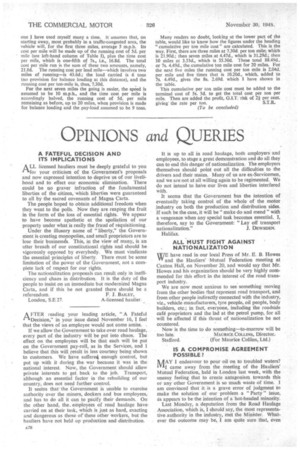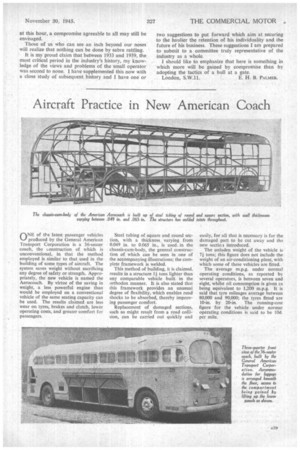OPINIONS and QUERIES
Page 38

Page 39

If you've noticed an error in this article please click here to report it so we can fix it.
A FATEFUL DECISION AND ITS IMPLICATIONS
A LL licensed hauliers must be deeply grateful to you
for your criticism of the Government's proposals and now expressed intention to deprive us of our livelihood and to effect our economic elimination. There could be no graver infraction of the fundamental liberties of the citizen, which liberties were guaranteed to all by the sacred covenants of Magna Carta.
The people hoped to obtain additional freedom when they went to the polls. Now they are reaping the fruit in the form of the loss of essential rights. We appear to have become apathetic at the spoliation of our property under what is really the fraud of requisitioning.
Under the illusory name of "liberty," the Government is creating monopolies, and small proprietors are to lose their businesses. This, in the view of many, is an utter breach of our constitutional rights and should be vigorously opposed by everybody. We must vindicate the essential principles of liberty. There must be some limitation of the power of the Government, not a complete lack of respect for our rights.
The nationalization proposals can result only in inefficiency and chaos in distribution. It is the duty of the people to insist on an immediate but modernized Magna Carta, and if this be not granted there should be a
referendum. F. J. BAILEY,
London, S.E 27. A-licensed haulier..
A FTER ceading your leading article, "A Fateful "Decision," in your issue dated November 16, I feel that the views of an employee would not come amiss.
If we allow the Government to take over road haulage, every part of the industry will be put into chaos. The effect on the employees will be that each will be put on the Government pay-roll, as in the Services, and I believe that this will result in less courtesy being shown to customers. We have sufferegi enough control, but put up with it during the war because it was in the national interest. Now, the Government should allow private interests to get back to the job. Transport, although an essential factor in the rebuilding of our country, does not need further control.
It seems that the Government is unable to exercise authority over the miners, dockers and bus employees, and has to do all it can to pacify their demands. On the other hand, the. employees of road haulage havecarried on at their task, which is just as hard, exacting and dangerous as those of these other workers, but the hauliers have not held up production and distribution. It is up to all in road haulage, both employers and employees, to stage a great demonstration and do all they can to end this danger of nationalization. The employers themselves should point out all the difficulties to the drivers and their mates. Many of us are ex-Servicemen, and we are not at all willing again to be regimented. We do not intend to haVe our lives and liberties interfered with.
It seems that the Government has the intention of eventually taking control of the whole of the motor industry on both the production and distribution sides. If such be the case, it will be " make do and mend" with a vengeance when any special task becomes essential. I, therefore, say to the Government: "Lay off transport nationalization." DEWSDEN. Halifax.
ALL MUST FIGHT AGAINST NATIONALIZATION
WE have read in our local Press of Mr. E. B. Howes " and the Hauliers' Mutual Federation meeting at Caxton Hall, on November 20, and would say that Mr. Howes and his organization should be very highly commended for this effort in the interest of the road transport industry.
We are now most anxious to see something moving from the other bodies that represent road transport, and from other people indirectly connected with the industry, viz., vehicle manufacturers, tyre people, oil people, body builders, etc.; in fact, everyone, including the roadside cafe proprietors and the lad at the petrol pump, for all will be affected if this threat of nationalization be not countered.
Now is the time to do something—to-morrow will be
too late. MAURICE COLLINS, Director.
Stafford. (For Maurice Collins, Ltd.) IS A COMPROMISE AGREEMENT POSSIBLE?
MAY I endeavour to pour oil on to troubled waters? "II came away from the meeting of the Hauliers' Mutual Federation, held in London last week, with the uneasy feeling that to create antagonism towards this or any other Government is so much waste of time. I am convinced that it is a grave error of judgment to make the solution of our problem a " Party " issue, as appears to be the intention of a hot-headed minority.
Last MOnday, a deputation from the Road Haulage Association, which is, I should say, the most representative .authority in the industry, met the Minister. Whatever the outcome may be, I am quite sure that, even
at this hour, a compromise agreeable to all may still be envisaged.
Those of us who can see an inch beyond our noses will realize that nothing can be done by sabre rattling.
It is my proud claim that between 1933 and 1939, the most critical period in the industry's history, my knowledge of the views and problems of the small operator was second to none. I have supplemented this now with a close study of subsequent. history and I have one or two suggestions to put forward which aim at securing to the haulier the retention of his individuality and the future of his business. These suggestions I am prepared to submit to a committee truly representative of the industry as a whole.
I should like to emphasize that here is something in which more will be gained by compromise than by adopting the tactics of a bull at a gate.
London, S.W.11. E. H. B. PALMER.




























































